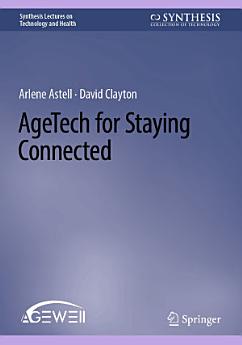AgeTech for Staying Connected
About this ebook
About the author
Arlene J. Astell is Professor of Cyberpsychology at Northumbria University and Associate Professor in the Occupational Sciences & Occupational Therapy and Psychiatry Departments at the University of Toronto. She is Director of the Dementia Ageing Technology Engagement (DATE) lab, which promotes positive ageing through creative applications of technology and digital resources. She received her Ph.D. and B.Sc. in Psychology from the University of Warwick, and is a British Psychological Society qualified Clinical Psychologist. Professor Astell’s internationally recognised research focuses on leveraging existing digital functionality and co-producing novel applications with older adults, especially those living with cognitive impairment. This includes smart devices, exergames, eye tracking glasses, and large language models to promote maintenance of cognitive, functional, and social abilities.
Dr. David Clayton currently works as a Patient and Public Involvement Lead at the University of Leicester, where he supports the involvement of older people in research and the design of new technological devices in cardiovascular sciences. He received his Ph.D. in Sociological Studies from the University of Sheffield researching the use of technology by older people to alleviate loneliness and has continued researching in this area, publishing several articles. His professional background is in social work and the transformation of social care services. He has 20 years of experience working in a variety of social care roles, including the management, commissioning, and development of services to support older and disabled people.




